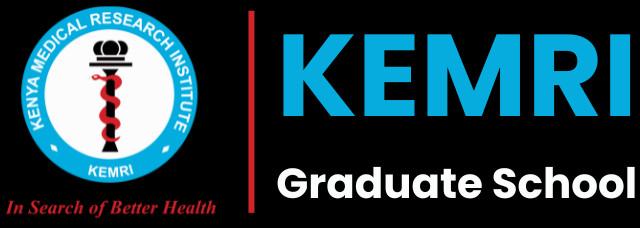
Since 2003, KGS has enrolled more than 2000 students at Master, Doctoral and Postdoctoral levels
The KEMRI Graduate School (KGS) is the university arm of KEMRI offering specialized postgraduate degrees in line with KEMRI’s mandate. The aim of KGS is to develop a human resource base equipped with updated research skills and knowledge to provide solutions to the rapidly growing healthcare deliver challenges facing the African region.
The KEMRI Graduate School offers 6 Master of Science and Doctoral degree in Public Health programmes.
The KEMRI Graduate School offers 10 Master of Science and Doctoral degree in Biomedical Sciences programmes.
The KEMRI Graduate School offers 4 Master of Science and Doctoral degree in Pharmarcy programmes.
Apply to KEMRI Graduate School





Read All News
The KEMRI Graduate School (KGS) is the university arm of KEMRI offering specialized postgraduate degrees in line with KEMRI’s mandate. The aim of KGS is to develop a human resource base equipped with updated research skills and knowledge to provide solutions to the rapidly growing healthcare deliver challenges facing the African region.
A combination of academic, research, and global partnerships available at KEMRI makes postgraduate study a fertile environment for young scientists aspiring to build a future rewarding career in health research and innovation.
At KEMRI Graduate School, students experience a transformative journey of self-development through our specialized programs in medicine and research. Our expert faculty provide personalized mentorship, fostering critical thinking, problem-solving, and leadership skills.
The diverse learning environment encourages collaboration, communication, and global perspectives. Kemri equips students with the tools and knowledge to excel in their careers, make meaningful contributions to the field, and emerge as well-rounded professionals.
The KEMRI Graduate School (KGS) is the university arm of KEMRI offering specialized postgraduate degrees in line with KEMRI’s mandate. The aim of KGS is to develop a human resource base equipped with updated research skills and knowledge to provide solutions to the rapidly growing healthcare deliver challenges facing the African region.
A combination of academic, research, and global partnerships available at KERMI makes postgraduate study a fertile environment for young scientists aspiring to build a future rewarding career in health research and innovation.
Our alumni network spans across the globe, offering a wealth of opportunities for networking, mentorship, and professional growth. Through alumni events, workshops, and collaborations, students gain valuable insights, career advice, and access to job opportunities in the field of medicine and research.
Alumni often return to share their experiences, provide guidance, and inspire current students on their academic and professional journeys. This strong sense of community and support from Kemri Graduate School alumni fosters lifelong connections, opens doors to new possibilities, and enriches the student experience.
We offer a comprehensive Masters programs, equipping students with skills to tackle global health challenges.
We offer a comprehensive Doctors of Phylosophy programs, equipping students with skills to tackle global health challenges.
We offer short courses that have been tailormade to help participants handle public health challenges.
Get updates to news and events

Kenya Medical Research Institute
P.O Box 54840, 00200
Mbagathi Road,
Off Raila Odinga Way
Nairobi, Kenya
Tel: (254) 0202722541/4,
0713112853/4
graduateschool@kemri.go.ke